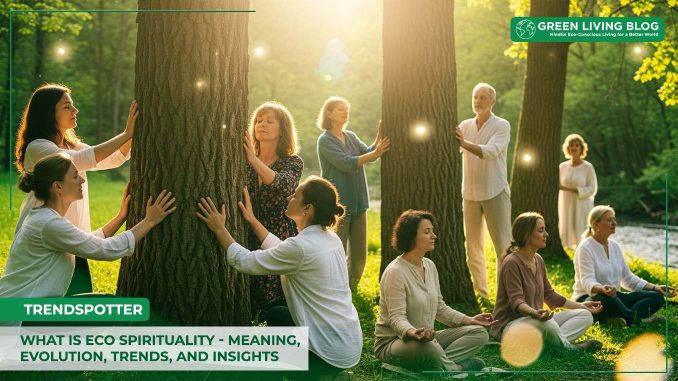
What Is Eco-Spirituality – Meaning & Origins

Eco-spirituality is the idea that the natural world is sacred and that looking after the environment is a spiritual and moral duty. This belief is not limited to any one faith; you’ll find eco-spirituality in Christianity, Islam, Paganism, Buddhism, and among people with no formal religion.
At its heart, eco-spirituality means seeing the Earth as something to respect and protect, and recognising that our own wellbeing is closely tied to the health of the planet. (Source: Wikipedia)
Eco-Spirituality – Evolution
- Celtic and Druidic traditions treated forests, rivers, and landscapes as sacred. Many indigenous beliefs saw the land as alive and holy.
- In the 20th century, as issues like climate change became urgent, people and faith communities started framing environmental problems as spiritual challenges.
- Influential thinkers such as Thomas Berry argued that modern society needed a new relationship with nature—one based on respect for all living things. (Source: Ecological Spirituality)
- In 1962, the Findhorn community was founded in Scotland, becoming a world-famous example of a group combining meditation, spiritual practice, and eco-living. (Source: Findhorn Foundation)
- The 1980s saw movements like ecofeminism and New Age spirituality become more popular, promoting ideas like “Mother Earth” and the Gaia hypothesis (the Earth as a living system). (Source: Hindu Religion and Environmental Well-being)
Eco-Spirituality – Interest and Preferences in the UK
- Seeing nature as sacred: Many people in the UK view forests, rivers, animals, and even soil as worthy of respect—not just resources for human use. In Christian “creation care,” Islamic stewardship, and even in secular worldviews, the message is similar: the natural world deserves our care.
- Everything is connected: Eco-spirituality teaches that humans are just one part of a much bigger web of life. What we do to nature, we do to ourselves. (Source: Brookes University)
- Ritual and practice: In the UK, this can mean attending a solstice celebration at Stonehenge, joining a “Forest Church” service outdoors, or simply practicing mindfulness in a local park. Church-led “Eco Church” schemes encourage practical steps like recycling, switching to renewable energy, and planting wildlife gardens. (Source: Institute for the Impact of Faith in Life (IIFL))
Eco-Spirituality – Stats and Insights
- 87% of UK adults say that access to nature is important for their physical and mental wellbeing, and 92% of people feel a personal responsibility to look after nature. (Source: Aviva)
- The number of people identifying with nature-based spirituality is rising. Shamanism grew from 650 to over 8,000 people between 2011 and 2021, and there are now about 74,000 Pagans in England and Wales. (Source: The Pagan Foundation)
- More than 8,000 UK churches take part in the Eco Church programme, making green action part of their faith. (Source: A Rocha UK)
Recent Trends Around Eco-Spirituality in the UK
Eco-spirituality is moving from the fringe into the mainstream.
- A Rocha UK’s Eco-Church scheme is a leading example. This initiative empowers local churches to implement a five-area action plan (Worship and Teaching, Management of Buildings, Management of Land, Community and Global Engagement, and Lifestyle) to achieve bronze, silver, and gold awards.
- Public attitudes are changing too: a majority of Brits now say that taking care of the environment is a moral or spiritual issue, not just a technical or political one. (Source: Theos).
- However, beliefs don’t always translate into action. A 2021 ONS survey found that while 72% of adults were worried about climate change, less than 20% had made significant changes to their lifestyle in response to environmental concerns. (Source: ONS)
Further Resources & Communities
- The Sustainable Living Starter Guide
- Eco-spirituality ― How to Blend Environmental Preservation with Personal Wellbeing
- A Rocha UK Eco Church
- Findhorn Foundation
- Braiding Sweetgrass by Robin Wall Kimmerer—a popular book blending indigenous wisdom and eco-spiritual thinking.
- Wild Law
If you want to share more information related to this topic with us, feel free to get in touch.
Disclaimer: All the information provided was correct at the time of publication (September 2025) and was collected with the help of accredited tools and AI.
![]()


Leave a Reply
You must be logged in to post a comment.